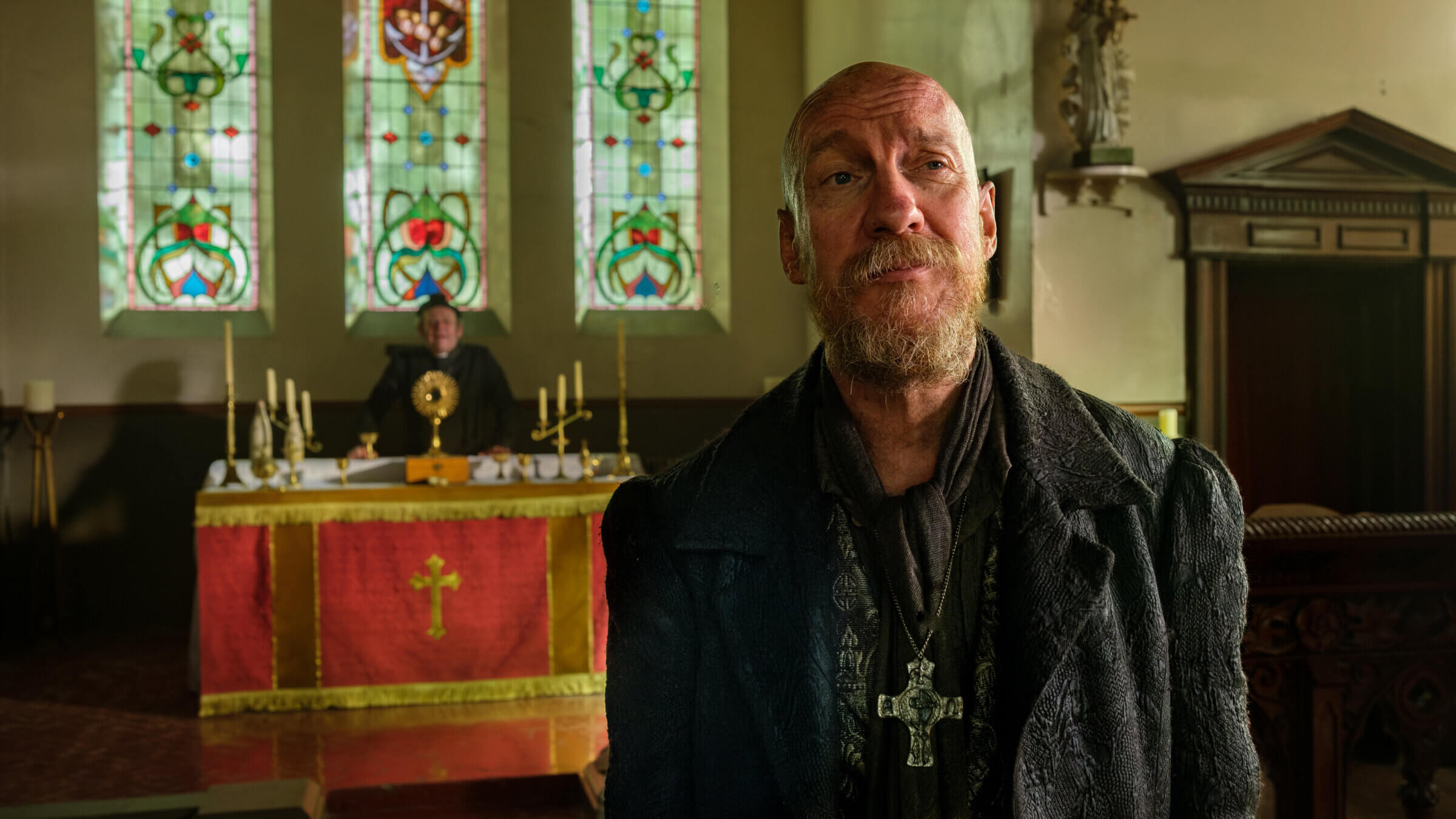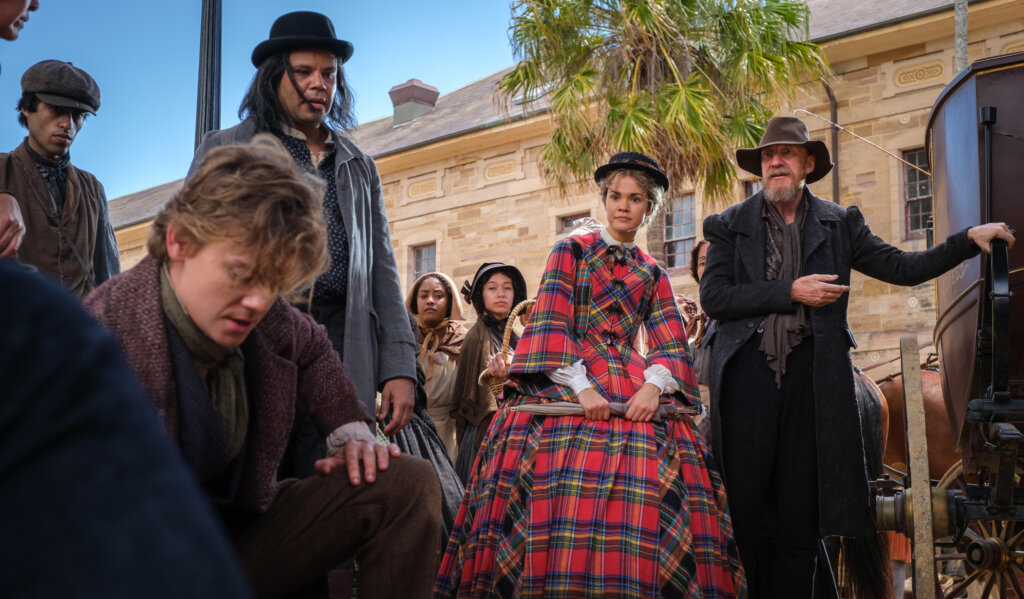Does ‘The Artful Dodger’ finally fix the Fagin problem?
How a new take on ‘Oliver Twist’ finds its Jewish villain in a church

David Thewlis as Fagin in Hulu’s The Artful Dodger. Photo by John Platt/Hulu
When The Artful Dodger, the new Oliver Twist sequel series on Hulu, first released publicity stills, two of them showed the story’s villain, Fagin, inside a church with a cross hanging from his neck.
Immediately, I had questions.
Was Fagin, referred to most frequently in Dickens’ novel as “the Jew,” now a Christian? Was he being retconned into always being one, removing the original character’s antisemitic baggage? Or was he, most troublingly of all, being set up to leave behind his wretched ways as a ringleader of child pickpockets to find grace and salvation in Christ?
Maybe. Or, perhaps, true to his nature, he was just on another con for which he got togged up like a priest.
All this I wondered, even before I gave a thought to how, in this post-Oliver story, Fagin was alive when Dickens left him hanging from a gallows. Watching the first four episodes of The Artful Dodger, a Guy Ritchian romp that imagines a grownup version of the titular thief settled in Colonial Australia and plying his clever fingers as a surgeon, I found out exactly what Fagin was up to, and I gotta say, I’m all about it.
To begin with, creators James McNamara, David Maher and David Taylor’s twist (forgive me) on Dickens’ book is decidedly unsentimental, trading in any treacle for grisly, bone-saw satire. (At one point, Dodger, played by Thomas Brodie Sangster, delivers the show’s verdict on the original story’s insipid orphan protagonist: “Everyone hates Oliver Twist — he’s a wet lettuce.”)
When Dodger is reunited with Fagin (David Thewlis), who washes ashore with a shipment of prisoners, he reluctantly enlists his old parental figure’s help as he works to clear off a gambling debt. But just to show there’s still bad blood between the two, Dodger, who lives in a garret room and survives on tithes, takes every opportunity to call his elderly companion a “syphilitic scarecrow” and remark how he looks like he was “spat out of a bilge hole” or “stepped out of a child’s nightmare.”
Fagin takes these insults in stride, and is overall a good-natured chap. Unlike in the BBC Oliver Twist prequel series, Dodger, this Fagin doesn’t wear a yarmulke and any references to his background are entirely oblique if not altogether absent. In any case, the traits that define him can’t be chalked up to an ethnicity.
The show’s milieu, with a hospital staffed by nuns and a naval base peopled with military men who profess deep faith while entertaining each deadly sin and breaking any number of commandments, is decidedly Christian. It has its knives — or rather scalpels — out for venal, adulterous churchgoers and their hypocritical institutions. When Fagin accompanies Dodger on a house call to the chief of police’s wife, the lady of the house insists “the only precious things here are the words of Jesus,” before caressing the good doctor’s knee.

In the second episode, “Blessings of St. Coccyx,” Fagin is in a pub where he overhears a Catholic priest lamenting how Port Victory’s church is not a site for a pilgrimage. It doesn’t have any big draws like saints’ bones. Lest we think the priest is still committed to his position, even with its lack of prestige, he says he’s “often wondered about conversion,” as he hears the Protestants have a bit more scratch.
Next thing you know, Fagin is asking questions about a “holy conflation between money, bones and Catholics.” (Dodger asks if he’s considering converting, but never specifies from what.)
When Fagin meets a nun at the hospital as she’s disposing of a sex worker’s tailbone, he hatches an idea and is soon chatting with the town’s priest about a certain relic — hence the promo photos of Thewlis at an altar looking like Hugh Jackman’s Jean Valjean at the time of his religious epiphany.
I don’t want to give too much away, but suffice it to say that if any group has something to be angry about in The Artful Dodger, it’s not the Jews.
As Thewlis plays Fagin — his “oys” sound a whole lot more like “ois” — there is nothing in the episodes I had access to that identifies him as a member of the tribe. He eats oysters, muses over how boring the afterlife sounds (“where’s the booze in heaven?”) and is even revealed to have a first name that, assuming it’s not an alias, one could reasonably call his Christian name. (Sorry, Steely Dan fans, it’s not Donald.)
This isn’t to say that the character has no religious dimension or that, in his time in the church, posing as a holy man, he doesn’t argue with God as Jews are wont to do.
“Forgive me, whoever or whatever is up there,” Fagin prays in a confessional, as organ music plays faintly in the background. “I’ve done so much terrible and wrong in this life — and I knows it. And I ain’t apologizing, ’cause you and I know I’ll be doing the same again tomorrow. And you give me this nature, so, it’s as much your issue as it is mine.”
Reviewing the situation, as his musical counterpart did, this Fagin self-identifies as Hashem and Popeye do: he is who he is — and Jewishness didn’t make him that way.
The Artful Dodger debuts on Hulu Nov. 29.
A message from our Publisher & CEO Rachel Fishman Feddersen

I hope you appreciated this article. Before you go, I’d like to ask you to please support the Forward’s award-winning, nonprofit journalism so that we can be prepared for whatever news 2025 brings.
At a time when other newsrooms are closing or cutting back, the Forward has removed its paywall and invested additional resources to report on the ground from Israel and around the U.S. on the impact of the war, rising antisemitism and polarized discourse.
Readers like you make it all possible. Support our work by becoming a Forward Member and connect with our journalism and your community.
— Rachel Fishman Feddersen, Publisher and CEO






























